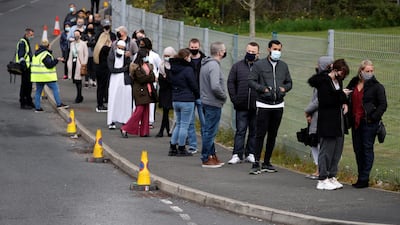The Covid-19 strain first detected in India will “get everywhere” unless an outbreak in north-west England is contained, a leading scientist said, as Prime Minister Boris Johnson admitted he was "anxious" about the spread of the variant.
Prof James Naismith, a biologist and director of the Rosalind Franklin Institute, told authorities that the strain should be viewed as a "countrywide problem" and attempts to localise restrictions on Bolton in Greater Manchester to tackle a surge in cases would probably fail.
"It will get everywhere – we keep learning this lesson but we know this will be the case," he told the BBC Radio 4 Today programme on Thursday.
“When we tried having different restrictions in different regions, it didn’t really make any difference. A localised strategy for containment will not work.”
Mr Johnson said the country's road map out of lockdown was still on track despite the concerns.
"We are anxious about it - it has been spreading," he said.
"We're ruling nothing out. "At the moment I can see nothing that dissuades me from thinking we'll be able to go ahead on Monday and June 21 everywhere."
The government’s Sage committee of scientific advisers will meet on Thursday as fears over the coronavirus variant continue to grow.
Bolton has one of the highest instances of the Indian variant in the UK, with a particularly sharp increase in case numbers among unvaccinated people under the age of 25.
There is speculation that from Monday, Bolton might not join England’s next stage of lockdown easing when hospitality venues open for indoor service and people are allowed to visit each other’s homes.
Everyone aged over 18 in Blackburn, another town in northern England, will be offered the Covid-19 vaccine after a surge in the Indian variant.
Environment Secretary George Eustice said the government “can’t rule anything out” when pressed on the issue of local lockdowns on Wednesday.
Meanwhile, Imperial College London’s React study of coronavirus cases, based on swab tests between April 15 and May 3, found the UK infection rate was half the rate recorded in March.
However, the Indian variant could be spreading faster, at least in London, than the strain first identified in Kent in south-east England last year. The highly transmissible UK variant generated the surge in cases in December that led to England’s third national lockdown.
There were 1,723 cases of the Indian variant identified in the study, more than three times the 520 infections detected last week by Public Health England.
Prof Paul Elliott, director of the React programme, said little was known about the Indian variant.
“We need to understand more about it,” he said.
Prof Tom Wenseleers of the University of Leuven in the Netherlands, who led a separate study, also sounded the alarm over the spread of the Indian strain based on cases occurring in people with no recent travel history. He said it was “outcompeting the Kent variant in terms of relative representation”.
“It is likely this Indian variant of concern does have a growth advantage over the Kent variant,” he said.
Prof Naismith said his gut feeling was that the UK might be forced to hold off on the fourth and final step of lockdown easing on June 21 if the strain was found to evade immunity from vaccines.
“The vaccines don’t 100 per cent prevent infection for people but they almost 100 per cent prevent hospital admission and serious illness,” he said.
“We don’t know enough about whether the Indian strain will behave differently to that.”
Mr Johnson told the House of Commons on Wednesday there was “increasing concern” about the Indian variant.
“It may be more transmissible ... maybe even considerably more transmissible,” he said.
More on coronavirus
'Chernobyl' moment: international panel urges greater WHO powers to tackle new diseases
Airlines warned travel push will bring Covid variants into UK
Delayed Covid-19 doses could cut mortality rates, US study finds









